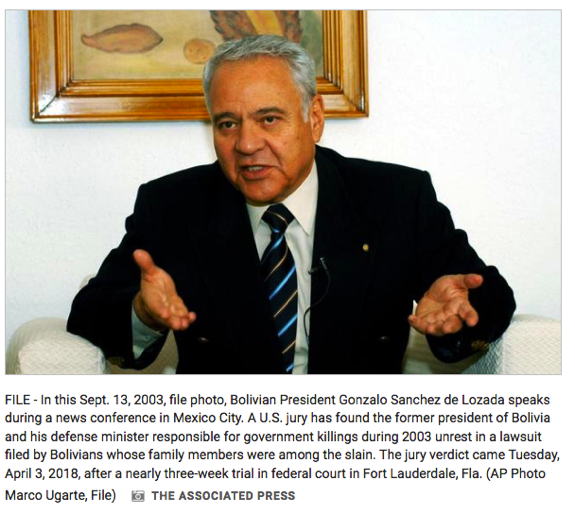
Ex-Bolivian president loses civil suit involving 2003 unrest
April 3. 2018 - USNews.com
MIAMI (AP) — A U.S. jury on Tuesday found a former president of Bolivia and his defense minister responsible for killings by security forces during 2003 unrest in the South American nation, awarding $10 million in damages in a lawsuit filed by Bolivians whose relatives were among the slain.
The jury verdict came Tuesday after a nearly three-week trial of the civil suit in federal court in Fort Lauderdale, Florida. The jury found against former Bolivian President Gonzalo Sanchez de Lozada, and his former defense minister, Jose Carlos Sanchez Berzain. Both have been living in the U.S. after fleeing Bolivia in 2003.
Lawyers for the two former officials vowed to seek to have the verdict overturned.
In the lawsuit originally filed in 2007, relatives of eight Bolivians who died claimed the two officials planned to kill thousands of civilians to crush political opposition during a time of civil unrest known as the "Gas War." The lawsuit was filed under the Torture Victim Protection Act, which authorizes suits in the U.S. for extrajudicial killings.
The unrest erupted in the fall of 2003 as street protests in Bolivia over use of the country's vast natural gas reserves boiled over. Demonstrators threw up street blockades of flaming debris and rubble in several places including on the outskirts of the capital of La Paz, and violent clashes between police and security forces with the civilian protesters turned deadly at times.
At times, government forces intent on clearing street barricades fired on demonstrators, mainly in the El Alto municipality adjacent to La Paz, leading to deaths. Other fatalities were reported in confrontations between security forces and Bolivian miners marching to the capital in support of the protesters. Many of the civilian victims were indigenous Aymara Bolivians.
The unrest marked the decline of traditional political parties in that nation and the rise of new leaders including Evo Morales, a populist leader of coca growers who later became Bolivia's first indigenous president. Now in his third term, Morales tweeted praise late Tuesday for the "perseverance" of those who pressed suit, saying they've obtained a court decision that "draws us ever closer to justice" in the case.
Plaintiffs also lauded the decision.
"After many years of fighting for justice for our family members and the people of Bolivia, we celebrate this historic victory," said plaintiff Tefilo Baltazar Cerro, whose pregnant wife was killed by a bullet fired through the wall of a house. He added in an emailed statement: "Fifteen years after they fled justice, we have finally held Sanchez de Lozada and Sanchez Berzain to account for the massacre they unleashed against our people."
The jury found the former officials responsible because they had ordered the military to use deadly force in the confrontations.
"The plaintiffs demonstrated immense courage in relentlessly pursuing justice for over a decade," said Judith Chomsky, a Center for Constitutional Rights attorney for the plaintiffs. "They have set an example for anyone fighting for accountability for human rights abuses worldwide."
Attorneys for the two ex-officials said they have asked the judge for a ruling that would essentially overturn the jury verdict for legal reasons, which will continue the case for the time being. An appeal is also possible.
"We disagree with the jury's verdict and believe that the proof was so lacking that the case never should have gotten to a jury," said attorney Steve Raber in an email statement. "We trust the process and believe that the verdict will be overturned when the law is correctly applied."
The defense had contended that the civilian deaths were more a product of crossfire than intentional killings and that the government was simply responding to a crisis. Authorities say at least 64 people died and more than 400 others were injured in the violence that year.
Sanchez de Lozada was president of Bolivia twice, serving the first term from August 1993 until August 1997 and again from August 2002 until October 2003. Sanchez Berzain was defense minister in the second term.
_____
Follow Curt Anderson on Twitter: twitter.com/Miamicurt
_____
This story has been corrected to show that at least 64 people were killed in the 2003 unrest in Bolivia.